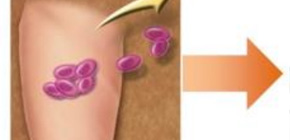
First transplantation using skeletal myoblast sheets for treating ischemic cardiomyopathy performed
Will promote regenerative medicine for severe heart failure patients
The Department of Cardiovascular Surgery at the Graduate School of Medicine, Osaka University prepared for clinical applications of autologous skeletal muscle-derived cell sheets, called “heart sheets,” for patients with severe heart failure due to ischemic cardiomyopathy. Terumo Corporation, the manufacturer of the sheets, made an application for approval of the use of these sheets for severe heart failure patients due to ischemic cardiomyopathy. The department conducted the first transplantation of autologous skeletal muscle-derived cell sheets, which was covered by government-managed health insurance, on August 5, 2016.
For treatment of severe heart failure, heart transplantation is the most effective method; however, a deficiency in organ supply is a serious problem in Japan, so it is expected to be difficult to promote transplantation. In addition, artificial hearts have problems of infectious disease as well as complications such as cerebral thrombosis. As a new alternative therapy, expectations for regenerative medicine are being raised. The Department of Cardiovascular Surgery at the Graduate School of Medicine, Osaka University, has developed transplantation using autologous skeletal muscle-derived cell sheets for patients with severe cardiomyopathy since 2006.
Myocardial regeneration treatment using autologous skeletal muscle-derived cell sheets aims to recover the function of a patient’s heart by applying myoblast cell sheets made from skeletal muscle harvested from the patient on the surface of the heart failure-afflicted patient’s heart. Since these autologous skeletal muscle-derived cell sheets are made from cells of patients, transplantation causes no rejection. In clinical research, no reports of complications such as severe ventricular arrhythmia have been made.
This group performed clinical research on four cases of patients implanted with an artificial heart due to dilated cardiomyopathy, 38 cases of adult severe heart failure such as dilated cardiomyopathy and ischemic cardiomyopathy, and one case of child dilated cardiomyopathy. Furthermore, in order to expand the application of this treatment, investigator-initiated clinical trials for two cases of adult dilated cardiomyopathy and one case of child dilated cardiomyopathy have been conducted since December 2014. Based on the data on corporate clinical trials and clinical research, Terumo Corporation made a drug application for approval of the use of autologous skeletal muscle-derived cell sheets, heart sheets, for ischemic heart failure patients. They obtained approval with limited conditions and term from the Ministry of Health, Labour and Welfare in September 2015.
Following that, in order to start the clinical application of the heart sheets, this group harvested skeletal muscles from the patient in the first case on May 30, 2016 and conducted the transplantation in August by using the cell sheets cultured from the harvested skeletal muscles. Thanks to the transplantation of autologous skeletal muscle-derived cell sheets using patients’ cells, it is expected that the condition of patients with severe heart failure will improve, so regenerative medicine using these sheets can be a new treatment method not requiring heart transplantation or artificial heart. Furthermore, this treatment method will make it possible to treat patients with heart failure such as those who cannot be on a waiting list to receive an organ transplant because they are 65 years old or older and/or have a complication, so there are no other effective treatment methods.
This treatment using heart sheets is covered by health insurance, so it is hoped that this treatment will spread throughout Japan to be helpful in the treatment of patients not only at Osaka University Hospital, but also in many medical institutes.
Related link
